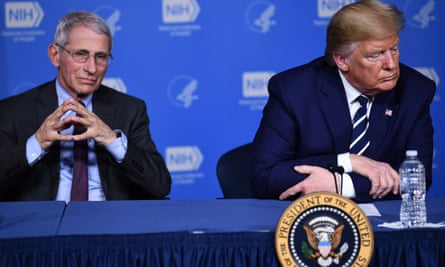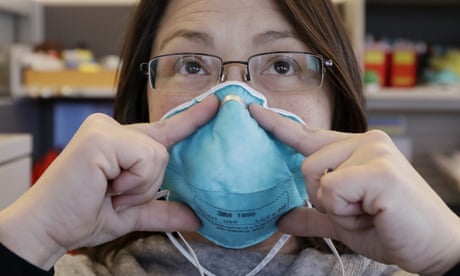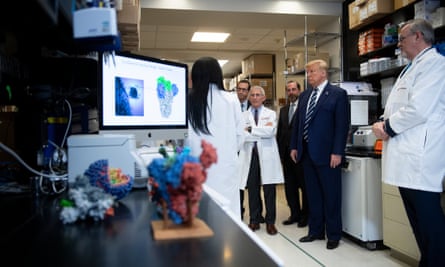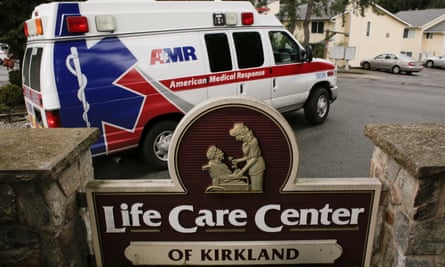White House's 'muzzled' coronavirus messaging is dangerous, experts say
Trump administration’s lack of transparency can make problem worse by sowing mistrust and can ‘endanger the public’

Donald Trump and Anthony Fauci, director of the NIH National Institute of Allergy and Infectious Diseases attend a meeting at the National Institutes of Health in Bethesda, Maryland, on Tuesday. Photograph: Brendan Smialowski/AFP via Getty Images
Amanda Holpuch and Lauren Aratani in New York
Amanda Holpuch and Lauren Aratani in New York
THE GUARDIAN
Published on Wed 4 Mar 2020
Published on Wed 4 Mar 2020
Two days before Larry Kudlow was announced as a member of the White House taskforce on coronavirus, the director of the National Economic Council declared coronavirus “contained” in the US, despite a plethora of data that suggested it was not.
“I won’t say airtight, but it’s pretty close to airtight,” Kudlow told CNBC, swaddling himself in a comforting narrative that was probably destroyed in his first meeting with the taskforce.

Coronavirus: health experts concerned US hospitals are not prepared
Kudlow’s public statements on the level of threat to the US posed by the virus outbreak sit uneasily in the minds of health experts warning of its severity, but they probably rested far more peacefully in the White House, where the favored message seems to be: there is nothing to see here.
There have been seven deaths from coronavirus in Washington state and many more positive cases are expected in the US, prompting public health experts to warn that honest, measured communication is of the utmost importance.
But that has not been the case with the Trump administration’s response so far, which has been marked by late action, delays, a lack of resourcing on tests, attacks on Democrats for warning of the seriousness of the crisis and, critics say, a politicized emphasis on placating the political concerns of the occupant of the Oval Office, rather than pursuing effective virus containment policy.
Michael Carome, director of the Health Research Group at Public Citizen, a not-for-profit consumer advocacy organization, said if the government’s response was not transparent, it could make the problem worse by sowing mistrust.
“People may do things that undermine the public health response to it because they may not believe what the government is saying, they may not follow instructions for how they protect themselves and respond to disruptions that may result,” Carome said.
 Anthony Fauci, center, the National Institute of Allergy and Infectious Diseases director, looks on next to Donald Trump during a tour of the National Institutes of Health’s Vaccine Research Center in Bethesda, Maryland, on Tuesday. Photograph: Brendan Smialowski/AFP via Getty Images
Anthony Fauci, center, the National Institute of Allergy and Infectious Diseases director, looks on next to Donald Trump during a tour of the National Institutes of Health’s Vaccine Research Center in Bethesda, Maryland, on Tuesday. Photograph: Brendan Smialowski/AFP via Getty Images
Carome also drew a line between Trump’s communication style – which is often brash, unreliable and incoherent – to the traditionally measured, fact-based style of health experts.
Last week, a senior health department official alleged that she was retaliated against after raising concerns that staff had been sent to assist Americans evacuated from China because of coronavirus without proper training or appropriate protective gear.
“If efforts are being made to muzzle them, to control messaging so that it suits the political needs of the administration, that’s ultimately going to endanger the public,” Carome said.
The nation’s top infectious disease expert, Anthony Fauci, hinted that publicly discussing facts while keeping the president happy was easier said than done.
“You should never destroy your own credibility,” Fauci, told Politico. “And you don’t want to go to war with a president. But you got to walk the fine balance of making sure you continue to tell the truth.”
For 35 years, Fauci has led the National Institute of Allergy and Infectious Diseases (NIAID) at the National Institutes of Health. He said he was not being muzzled from speaking about the coronavirus outbreak – which he does not expect the US to escape “unscathed” – but that he has been told to run interviews past the vice-president’s office for clearance.
Fauci was one of several top public health officials reportedly told to run their messaging past Pence, after a CDC official warned the spread of coronavirus was inevitable.

There have been seven deaths from coronavirus in Washington state and many more positive cases are expected in the US, prompting public health experts to warn that honest, measured communication is of the utmost importance.
But that has not been the case with the Trump administration’s response so far, which has been marked by late action, delays, a lack of resourcing on tests, attacks on Democrats for warning of the seriousness of the crisis and, critics say, a politicized emphasis on placating the political concerns of the occupant of the Oval Office, rather than pursuing effective virus containment policy.
Michael Carome, director of the Health Research Group at Public Citizen, a not-for-profit consumer advocacy organization, said if the government’s response was not transparent, it could make the problem worse by sowing mistrust.
“People may do things that undermine the public health response to it because they may not believe what the government is saying, they may not follow instructions for how they protect themselves and respond to disruptions that may result,” Carome said.
 Anthony Fauci, center, the National Institute of Allergy and Infectious Diseases director, looks on next to Donald Trump during a tour of the National Institutes of Health’s Vaccine Research Center in Bethesda, Maryland, on Tuesday. Photograph: Brendan Smialowski/AFP via Getty Images
Anthony Fauci, center, the National Institute of Allergy and Infectious Diseases director, looks on next to Donald Trump during a tour of the National Institutes of Health’s Vaccine Research Center in Bethesda, Maryland, on Tuesday. Photograph: Brendan Smialowski/AFP via Getty ImagesCarome also drew a line between Trump’s communication style – which is often brash, unreliable and incoherent – to the traditionally measured, fact-based style of health experts.
Last week, a senior health department official alleged that she was retaliated against after raising concerns that staff had been sent to assist Americans evacuated from China because of coronavirus without proper training or appropriate protective gear.
“If efforts are being made to muzzle them, to control messaging so that it suits the political needs of the administration, that’s ultimately going to endanger the public,” Carome said.
The nation’s top infectious disease expert, Anthony Fauci, hinted that publicly discussing facts while keeping the president happy was easier said than done.
“You should never destroy your own credibility,” Fauci, told Politico. “And you don’t want to go to war with a president. But you got to walk the fine balance of making sure you continue to tell the truth.”
For 35 years, Fauci has led the National Institute of Allergy and Infectious Diseases (NIAID) at the National Institutes of Health. He said he was not being muzzled from speaking about the coronavirus outbreak – which he does not expect the US to escape “unscathed” – but that he has been told to run interviews past the vice-president’s office for clearance.
Fauci was one of several top public health officials reportedly told to run their messaging past Pence, after a CDC official warned the spread of coronavirus was inevitable.

An ambulance transports a person from the Life Care Center of Kirkland, a long-term care facility linked to several confirmed coronavirus cases, in Kirkland, Washington, on Tuesday. Photograph: David Ryder/Reuters
The CDC’s announcement triggered a dramatic response from the media and public health officials across the US, but Trump insisted everything was fine.
Last week, Trump tweeted: “Coronavirus is very much under control in the USA.” He has repeatedly claimed warmer weather will cause coronavirus to disappear, though it is too early to know if that’s true. The day after the CDC said coronavirus’s spread was inevitable, the president said it wasn’t.
Over the weekend, he said Democrats were politicizing the crisis, and compared it to impeachment as their latest “hoax”.
Political appointees of the Trump administration, and the president’s children, have lined up to defend Trump’s response.
The acting white house chief of staff, Mick Mulvaney, told people to turn off the television and ignore media reports about the virus last week.
Mulvaney said the media had started paying attention to coronavirus because “they think this is going to be what brings down the president”. He did not mention the increased attention came days after the CDC declared coronavirus’s spread in the US was inevitable.
“When politics starts to get into the conversation, then people might start to feel they need to take a side and they might start filtering public health information through a partisan lens,” said Nathan Myers, associate professor in the political science department at Indiana State University.
If a health crisis is seen as a political issue, it can affect support for emergency funding to fight the outbreak and policies meant to stem its spread.
Myers highlighted how only Democrats signed on to a congressional letter asking for more information about faulty coronavirus test kits distributed by the CDC, a demonstrable problem that has even been raised by a few conservative media commentators.
“Oversight over something like a public health emergency should very much be a bipartisan thing,” Myers said. “Republicans can ask for information about these kinds of topics without attacking the administration or attacking the president.”
Myers’s book Pandemics and Polarization examined how a Republican-held Congress’s distrust of Barack Obama’s administration affected the government’s response to the Zika virus. Months before the 2016 presidential election, Republicans held up $1.1bn in funding to the outbreak by inserting provisions that would restrict funding to Planned Parenthood and reverse a ban on flying the Confederate flag at veterans’ cemeteries.
“This is why people hate Congress,” Senator Tim Kaine said at the time.
One of the few serious bipartisan efforts to emerge during the coronavirus outbreak is legislation to create automatic funding to respond to public health emergencies, much like existing processes to respond to natural disasters.
“That’s almost saying we don’t think Congress can be bipartisan enough to come together on these supplemental funding bills so we need to have a preparedness fund in place so it takes the politics out of the situation,” Myers said.
Despite a wave of support from Republican lawmakers, there has been pushback to Trump’s subdued messaging in the conservative magazine National Review. The writer Michael Brendan Dougherty said: “The wrong Donald Trump has shown up to deal with the coronavirus.”
Noting that Trump is a germaphobe who has been critical of China, Dougherty writes that instead “we’re getting Trump the market whisperer. We’re getting a Trump who is obviously bothered by the drop in the Dow Jones. We’re getting a Trump who plans to campaign on the conventional measures of success favored by his predecessors. We’re getting a Trump who is downplaying the seriousness of this disease, who is probably acting too late, and who is making promises he can’t keep.”
The National Review editor, Rich Lowry, was also critical of the administration’s decision to downplay the outbreak.
“By pooh-poohing worries about the virus and saying everything is under control, it is setting itself up for the charge, if things get even a little bad, that it was self-deluding and overly complacent,” Lowry wrote. “It will be accused of making mission-accomplished statements before the mission truly began.”
Those articles were missing from a missive the White House sent Monday night to reporters with subject line “Praise for the President’s Coronavirus Response”.
The message linked to tweets from lawmakers and three editorials in two right-leaning newspapers applauding the president.
The CDC’s announcement triggered a dramatic response from the media and public health officials across the US, but Trump insisted everything was fine.
Last week, Trump tweeted: “Coronavirus is very much under control in the USA.” He has repeatedly claimed warmer weather will cause coronavirus to disappear, though it is too early to know if that’s true. The day after the CDC said coronavirus’s spread was inevitable, the president said it wasn’t.
Over the weekend, he said Democrats were politicizing the crisis, and compared it to impeachment as their latest “hoax”.
Political appointees of the Trump administration, and the president’s children, have lined up to defend Trump’s response.
The acting white house chief of staff, Mick Mulvaney, told people to turn off the television and ignore media reports about the virus last week.
Mulvaney said the media had started paying attention to coronavirus because “they think this is going to be what brings down the president”. He did not mention the increased attention came days after the CDC declared coronavirus’s spread in the US was inevitable.
“When politics starts to get into the conversation, then people might start to feel they need to take a side and they might start filtering public health information through a partisan lens,” said Nathan Myers, associate professor in the political science department at Indiana State University.
If a health crisis is seen as a political issue, it can affect support for emergency funding to fight the outbreak and policies meant to stem its spread.
Myers highlighted how only Democrats signed on to a congressional letter asking for more information about faulty coronavirus test kits distributed by the CDC, a demonstrable problem that has even been raised by a few conservative media commentators.
“Oversight over something like a public health emergency should very much be a bipartisan thing,” Myers said. “Republicans can ask for information about these kinds of topics without attacking the administration or attacking the president.”
Myers’s book Pandemics and Polarization examined how a Republican-held Congress’s distrust of Barack Obama’s administration affected the government’s response to the Zika virus. Months before the 2016 presidential election, Republicans held up $1.1bn in funding to the outbreak by inserting provisions that would restrict funding to Planned Parenthood and reverse a ban on flying the Confederate flag at veterans’ cemeteries.
“This is why people hate Congress,” Senator Tim Kaine said at the time.
One of the few serious bipartisan efforts to emerge during the coronavirus outbreak is legislation to create automatic funding to respond to public health emergencies, much like existing processes to respond to natural disasters.
“That’s almost saying we don’t think Congress can be bipartisan enough to come together on these supplemental funding bills so we need to have a preparedness fund in place so it takes the politics out of the situation,” Myers said.
Despite a wave of support from Republican lawmakers, there has been pushback to Trump’s subdued messaging in the conservative magazine National Review. The writer Michael Brendan Dougherty said: “The wrong Donald Trump has shown up to deal with the coronavirus.”
Noting that Trump is a germaphobe who has been critical of China, Dougherty writes that instead “we’re getting Trump the market whisperer. We’re getting a Trump who is obviously bothered by the drop in the Dow Jones. We’re getting a Trump who plans to campaign on the conventional measures of success favored by his predecessors. We’re getting a Trump who is downplaying the seriousness of this disease, who is probably acting too late, and who is making promises he can’t keep.”
The National Review editor, Rich Lowry, was also critical of the administration’s decision to downplay the outbreak.
“By pooh-poohing worries about the virus and saying everything is under control, it is setting itself up for the charge, if things get even a little bad, that it was self-deluding and overly complacent,” Lowry wrote. “It will be accused of making mission-accomplished statements before the mission truly began.”
Those articles were missing from a missive the White House sent Monday night to reporters with subject line “Praise for the President’s Coronavirus Response”.
The message linked to tweets from lawmakers and three editorials in two right-leaning newspapers applauding the president.
1 comment:
This is sensible information! Where else will if ind out more?? Who runs this joint too? sustain the excellent function
DominoQQ
Judi Bola
Slot Online
Ceme Online
BCA368
BCA368
Post a Comment